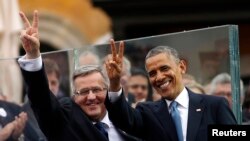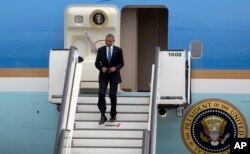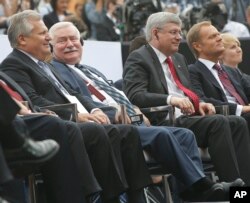U.S. President Barack Obama said the world must "stand with those who seek freedom," as he drew parallels between reforms taking place in Ukraine today and the elections in Poland 25 years ago that marked the beginning of the end of Communism.
Speaking Wednesday at a Freedom Day event in Warsaw, Obama hailed Poland's first partially free election in 1989 as a "landslide victory for freedom."
He said now the free world is united against what he called Russia's "dark tactics" in Ukraine, where in March Russian forces seized control of Crimea.
"Bigger nations must not be allowed to bully the small, or impose their will at the barrel of a gun or with masked men taking over buildings," Obama said.
"And the stroke of a pen can never legitimize the theft of a neighbor’s land, so we will not accept Russia’s occupation of Crimea or its violation of Ukraine’s sovereignty. Our free nations will stand united so that further Russian provocations will only mean more isolation and costs for Russia," the president added.
"We stand together because we believe that people and nations have the right to determine their own destiny — that includes the people of Ukraine," Obama said in Warsaw.
The president also restated America's commitment to its NATO allies.
"An attack on one is an attack on all. ... We stand together, now and forever, for your freedom is ours," Obama said.
“Poland will never stand alone. Estonia will never stand alone. Latvia will never stand alone. Lithuania will never stand alone. Romania will never stand alone," Obama added, naming the ex-Communist countries that - unlike Ukraine - have joined NATO and therefore enjoy protection as treaty allies.
"These are not just words," Obama said. "They are unbreakable commitments backed by the strongest alliance in the world and by the armed forces of the United States of America: the most powerful military in history."
Poland's 25-year history of democracy is an example to Ukraine of what could be achieved if a country is allowed to realize its aspirations, Obama said. But he noted another 25-year anniversary on June 4: the crackdown on pro-democracy activists in Tiananmen Square in Beijing.
"The story of this nation [Poland] reminds us that freedom is not guaranteed. And history cautions us to never take progress for granted. On the same day 25 years ago that Poles were voting here, tanks were crushing peaceful democracy protests in Tiananmen Square on the other side of the world," he said.
Meeting with Poroshenko
Before the ceremony, Obama met with Ukraine President-elect Petro Poroshenko, and announced $5 million in non-lethal aid to help Ukraine's military forces in their effort to battle pro-Russian separatists in eastern Ukraine.
Obama flew to Brussels later Wednesday for a working dinner with leaders from the Group of Seven nations. They will meet for further talks on Thursday.
The leaders quickly arranged the summit after deciding to boycott a Group of Eight meeting Russia was to host this week in Sochi. The boycott was in response to Russia's incursion into Crimea in March.
In Poland, President Obama heard from a leadership that wants a more robust U.S. military presence in the region, and tougher sanctions against Russia. But at the G-7, Obama faces a different situation among leaders in western Europe who are hesitant to enact stricter sectoral sanctions that could hurt their extensive trade ties with Moscow.
Obama's three-nation trip will also include a speech Friday at Omaha Beach in Normandy, France, during a ceremony for the 70th anniversary of the allied D-Day invasion against Nazi forces in World War II.
Obama, Russian President Vladimir Putin and Poroshenko will all be at the Normandy commemorations - the first time they have been in the same location since the crisis in Ukraine began - though there is no plan at the moment for them to have a meeting.
Germany and Britain, whose leaders will hold private meetings with Putin on the sidelines of the ceremony in France, both stepped up criticism of Russia's role in eastern Ukraine.
The delicate job of shoring up a common approach to Russia began late Wednesday, when Mr. Obama joined the other G-7 leaders for a working dinner at the European Community. It followed a short visit with King Philippe of Belgium at the Royal Palace in the Belgian capital.
German Chancellor Angela Merkel, in a speech to parliament in Berlin, urged Putin to use his influence to restrain the separatists and make them disarm and end occupations.
“If this doesn't happen... we won't shrink from imposing further sanctions,” she said.
The British Foreign Office accused Moscow of fomenting unrest in eastern Ukraine with “a torrent of disinformation” and of trying to intimidate Kyiv with a military buildup along the Ukrainian border.
Luis Ramirez reported from Brussels; some information for this report provided by Reuters and AFP.
Speaking Wednesday at a Freedom Day event in Warsaw, Obama hailed Poland's first partially free election in 1989 as a "landslide victory for freedom."
He said now the free world is united against what he called Russia's "dark tactics" in Ukraine, where in March Russian forces seized control of Crimea.
"Bigger nations must not be allowed to bully the small, or impose their will at the barrel of a gun or with masked men taking over buildings," Obama said.
"And the stroke of a pen can never legitimize the theft of a neighbor’s land, so we will not accept Russia’s occupation of Crimea or its violation of Ukraine’s sovereignty. Our free nations will stand united so that further Russian provocations will only mean more isolation and costs for Russia," the president added.
"We stand together because we believe that people and nations have the right to determine their own destiny — that includes the people of Ukraine," Obama said in Warsaw.
The president also restated America's commitment to its NATO allies.
"An attack on one is an attack on all. ... We stand together, now and forever, for your freedom is ours," Obama said.
“Poland will never stand alone. Estonia will never stand alone. Latvia will never stand alone. Lithuania will never stand alone. Romania will never stand alone," Obama added, naming the ex-Communist countries that - unlike Ukraine - have joined NATO and therefore enjoy protection as treaty allies.
"These are not just words," Obama said. "They are unbreakable commitments backed by the strongest alliance in the world and by the armed forces of the United States of America: the most powerful military in history."
Poland's 25-year history of democracy is an example to Ukraine of what could be achieved if a country is allowed to realize its aspirations, Obama said. But he noted another 25-year anniversary on June 4: the crackdown on pro-democracy activists in Tiananmen Square in Beijing.
"The story of this nation [Poland] reminds us that freedom is not guaranteed. And history cautions us to never take progress for granted. On the same day 25 years ago that Poles were voting here, tanks were crushing peaceful democracy protests in Tiananmen Square on the other side of the world," he said.
Meeting with Poroshenko
Before the ceremony, Obama met with Ukraine President-elect Petro Poroshenko, and announced $5 million in non-lethal aid to help Ukraine's military forces in their effort to battle pro-Russian separatists in eastern Ukraine.
Obama flew to Brussels later Wednesday for a working dinner with leaders from the Group of Seven nations. They will meet for further talks on Thursday.
The leaders quickly arranged the summit after deciding to boycott a Group of Eight meeting Russia was to host this week in Sochi. The boycott was in response to Russia's incursion into Crimea in March.
In Poland, President Obama heard from a leadership that wants a more robust U.S. military presence in the region, and tougher sanctions against Russia. But at the G-7, Obama faces a different situation among leaders in western Europe who are hesitant to enact stricter sectoral sanctions that could hurt their extensive trade ties with Moscow.
Obama's three-nation trip will also include a speech Friday at Omaha Beach in Normandy, France, during a ceremony for the 70th anniversary of the allied D-Day invasion against Nazi forces in World War II.
Obama, Russian President Vladimir Putin and Poroshenko will all be at the Normandy commemorations - the first time they have been in the same location since the crisis in Ukraine began - though there is no plan at the moment for them to have a meeting.
Germany and Britain, whose leaders will hold private meetings with Putin on the sidelines of the ceremony in France, both stepped up criticism of Russia's role in eastern Ukraine.
The delicate job of shoring up a common approach to Russia began late Wednesday, when Mr. Obama joined the other G-7 leaders for a working dinner at the European Community. It followed a short visit with King Philippe of Belgium at the Royal Palace in the Belgian capital.
German Chancellor Angela Merkel, in a speech to parliament in Berlin, urged Putin to use his influence to restrain the separatists and make them disarm and end occupations.
“If this doesn't happen... we won't shrink from imposing further sanctions,” she said.
The British Foreign Office accused Moscow of fomenting unrest in eastern Ukraine with “a torrent of disinformation” and of trying to intimidate Kyiv with a military buildup along the Ukrainian border.
Luis Ramirez reported from Brussels; some information for this report provided by Reuters and AFP.








